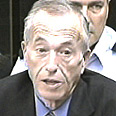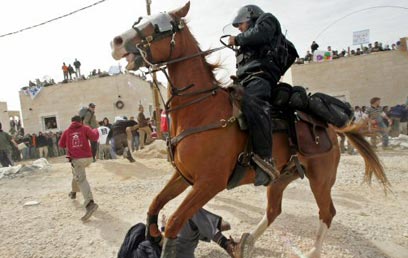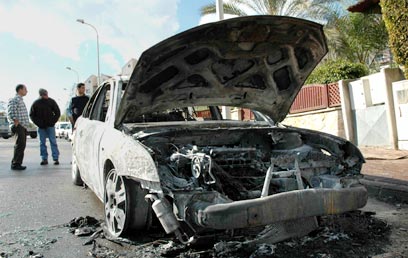
Ezra: Police won’t be punching bag
Internal security minister explains at start of Amona inquiry meeting why police officers won't testify before commission: 'There is no intention to reach the truth. Instead of summoning rioters, officers are being summoned. Police are being threatened'; Commission Chairman MK Steinitz says: 'We will investigate affair in most serious, objective manner'
"Everything we do is done in full agreement with the government," he said.
"We will not be a punching bag, not for the left and not for the right. The police have become a punching bag," he added.
Ezra charged that "there is no intention to reach the truth here. Instead of summoning the rioters, officers are being summoned."
"It's my decision whether to testify here or not. It's my duty toward the officers and their family members. I know what the police chief did, I know what the forces did, and I support them," he said.
The minister said that the police defined the Amona incidents as a level D disturbance, which includes using cold weapons and in which stun grenades or tear gas can be used. He added that in spite of this fact, the police mostly treated the incidents as a level C disturbance, which enabled using lesser means, such as clubs and horses.
Ezra added that the police were unable to use gas because "using gas is much more dangerous. The matter was considered and we didn’t want to use this method because it harmful for health."
Right-wing members of the committee said in response that "he prefers hitting them on the head with a club than using tear gas."
The minister was asked whether the police expected that there would be injuries and were there estimations before the operation.
He answered that "we were prepared, but afterwards we began receiving warnings and after seeing the behavior of the people in the field, and after thousands of people arrived, and there was an overall criticism by leaders. There were also a number of earlier incidents, including road blockings on the eve of our operation. The police forces were unable to reach Amona except by foot because the roads were blocked."
"We definitely knew that there were nails and boards in Amona… and that people are hiding on the roofs. We knew, and so did the government and the court. We went out to reinforce the law, and that's what we did," he added.

Protestors, police clash in Amona (Photo: Reuters)
When asked why the police did not block the roads in order to make it difficult for the thousands of people to reach the outpost, Ezra answered that "Amona is open from all directions. The IDF will do the right thing by answering this question."
Steinitz: Inquiry will be objective
Knesset Member Yuval Steinitz (Likud), the committee's chairman, said at the start of the meeting Wednesday: "I want to say here, in the clearest manner, that we will do everything in order to fulfill the mission imposed upon us by Israel's Knesset in the most serious, objective and respectful manner possible."
He added that the commission's discussions will be open to the public, "unless we are asked by the Shin Bet to close the discussions."
"We will mainly look into the decisions of the political echelon regarding the Amona evacuation, the way in which the senior professional ranks of the security forces understood the orders, the way in which it was translated in the field, and the question whether there are lessons and conclusions to be drawn from the severe event following the traumatic incidents and the injury of more than 200 people, which will be used by the government in the future," Steinitz said.

Amona commander's torched car (Photo: Yossi Zeliger)
MK Effie Eitam (National Union-National Religious Party), who was injured during the outpost evacuation, said at the start of the meeting that "I shall not take part in the discussions on the police's activity and I shall not interrogate witnesses."
MK Uri Ariel (National Union-National Religious Party), who also took part in the riots, said during the discussion that "since there was a claim, which I do not understand, that whoever was there, like me, cannot participate, I did not want to provide any minister with an excuse not to come here and reveal the entire truth, and this is what I believe they will do."
"I declared that I am ready not to take part, under the condition that the government announces that they would allow every officer and every person summoned to come here," he added.
MK Ariel asked Minister Ezra: "Are you aware of the Israel Police's reasonable measures for evacuating outposts?"
Ezra answered that "during severe disturbances police are allowed to use clubs, horses… and during level D, including use of cold weapons: stones, knives, axes… when one of these means is used, we can use stun grenades, tear gas, attack with horses using stun grenades and gas."
"Although we identified this disturbance as level D, we usually treated is as level C, meaning that we could have used more means than what we used," he added.










